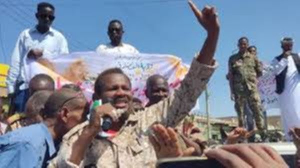Accra, July 19, GNA - A workshop on "Ensuring Farmers Livelihood and Food Security around the Kakum Conservation Area ended in Accra on Tuesday.
The project was designed to address the problem of crop-raiding by elephants and other wildlife that had hampered food security of 10 communities in the Kakum Conservation area using compatible land use planning and anti crop raiding techniques to reduce wildlife and human conflict.
The 232,000-dollar project, funded by the Food Security Project of the Food and Agriculture Organization (FAO), would end on July 31 2005. Some of the cost effective methods used were noisemaking to scare the elephants, burning of a mixture of pepper and animal dung on the farms and the hanging of rags smeared with a mixture of pepper and grease around the edges of the farms.
The overall objective of the project was to improve the food security of the affected communities and to serve as a pilot to be extended to other affected communities.
The Minister of Lands, Forestry and Mines, Professor Dominic Fobih commended the FAO, the Wildlife Division of the Forestry Commission and Conservation International for their support, which had mitigated the problem of poaching that had resulted from the confrontations and the total destruction of biodiversity.
He urged participants to come out with further improvement in the innovative low technologies, which were introduced and adopted by the project and modified with local peculiarities to make them cost effective.
Prof Fobih pledged the Ministry's support for the expansion of the project into other areas facing similar problems and appealed to the donors and stakeholders to support the replication of the project. Mr Pape Djiby Kone, FAO Country Representative, said it was in its mandate to improve standards of living of the people, ensure increased agriculture productivity, better the conditions of rural populations and to support the Government in its efforts to combat the multiple causes of food insecurity and to restore the basic human right to be free from hunger.
He expressed the hope that the workshop would examine the various experiences and lessons and share ideas for the next move in consolidating the result of the project and address food insecurity in similar communities.
"We remain Ghana's partner in ensuring achievement of the goals to alleviate hunger and improve the overall food security situation of the country", he said.
Okyeame Ampadu-Agyei, Country Director, Conservation International, said his organization believed that man and animals could live harmoniously together with better planning. He expressed his satisfaction that with support from other donors they had been able to address the Herculean task in the 10 pilot communities.
Mr Ofori Frimpong, Executive Director, Wildlife Division, said the Project had improved the relationship between farmers and the Kakum Field Staff, adding that the Division was spearheading the formation of conservation committees at the community level to be the grassroots focal point in decision-making in wildlife conservation matters.
General News of Tuesday, 19 July 2005
Source: GNA
















